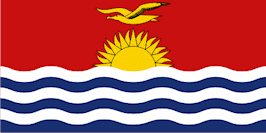Kiribati Government
 The constitution promulgated at independence establishes Kiribati as a sovereign democratic republic and guarantees the fundamental rights of its citizens.
The constitution promulgated at independence establishes Kiribati as a sovereign democratic republic and guarantees the fundamental rights of its citizens.
The judicial system consists of the Court of Appeal, the High Court, and Magistrates' Courts. The president makes all judicial appointments.
The unicameral House of Assembly (Maneaba) has 45 members: 43 elected representatives, one appointed member by the Banaban community on Rabi Island in Fiji, and the Attorney General on an ex officio basis. All of the members of the Maneaba serve 4-year terms. The speaker for the legislature is elected by the Maneaba from outside of its membership and is not a voting member of Parliament.
After each general election, the new Maneaba nominates at least three but not more than four of its members to stand as candidates for president. The voting public then elects the president from among these candidates. The president appoints a cabinet of up to 10 members from among the members of the Maneaba. Although popularly elected, the president can be deposed by a majority vote in Parliament. If a no confidence motion passes, a new election for President must be held. An individual can serve as president for only three terms, no matter how short each term is. As a result of this provision, former Presidents Tabai and Tito were constitutionally forbidden from serving as president again.
The Kiribati Constitution permits a President to be reelected twice. Within the constitutional limits, Parliament has repeatedly given sitting Presidents opportunities to run again, and Kiribati voters have repeatedly reelected incumbent Presidents.
Political parties exist but are more similar to informal coalitions in behavior. Parties do not have official platforms or party structures. Most candidates formally present themselves as independents. Campaigning is by word of mouth and informal gatherings in traditional meetinghouses. Kiribati parliamentary elections are nearly always decided on the basis of local issues and family ties. Thus, it is impossible for an outsider to predict results.
|
NEWSLETTER
|
| Join the GlobalSecurity.org mailing list |
|
|
|

